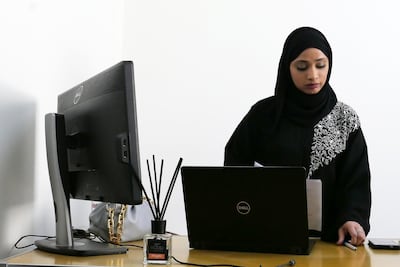Part-time jobs, flexible hours and shift-based work could help Emirati women pursue careers in science, technology, engineering and mathematics.
More women are taking up Stem opportunities in the UAE but many quit after working a few years in the industry when they get married and decide to start a family.
Expectations from employers and families often leave women overwhelmed and overworked, forcing many to leave.
Data published by the Federal Competitiveness and Statistics Authority in 2017, showed that close to 60 per cent of Emirati women were active in the workforce by their mid-twenties.
But this fell as they entered their thirties – a time when they probably had children. Employment dropped significantly among Emirati women in their forties.
Only 34 per cent of Emirati women were part of the workforce by the age of 45.
Sendeyah Al Hefeiti is an employee of Acciona, a Spanish multinational company involved in in infrastructure and renewable energy.
She works at the company’s Seawater Reverse Osmosis desalination plant in Fujairah.
Her typical day includes field work, testing water and chemical samples in the lab and producing reports.
Ms Al Hefeiti, 26, studied molecular biology at UAE University. “I wanted to be different. I wished to challenge myself and see if I could do this job," she says.
“Working as a woman in the field is difficult, as I have to travel from one place to another, and some family members asked me why I took up a job that was so hard."

Ms Al Hefeiti, who is married, said employers should keep in mind the UAE's cultural values and traditions to retain women.
She gave the example of her relative who had to drop out of the workforce because it was difficult to travel after she had her first child.
“Employers can offer better work timings and more flexibility so that women’s work does not interfere with their personal lives,” Ms Al Hefeiti said.
“If women were given online work opportunities, or shift jobs shared between colleagues, it would be easier for them to continue once they have children.
“It would be great to have part-time jobs for those who can work during specific times.”
Many Emirati women are highly qualified. A 2018 report by Times Higher Education found nearly eight in 10 learners opted to study science as their major.
The report said 77 per cent of students taking computer science classes in the UAE were female – ranking well above the figure of 19.8 per cent in Canada, 17.9 per cent in France and 17.1 per cent in the UK. In Oman, 93 per cent of computer-science studies are female.
But for many female Emirati graduates, working after motherhood presented challenges.
Saadah Alyalyali, an IT superintendent at Acciona in Fujairah, has worked for nearly a decade.
The 34-year-old Emirati has a network engineering degree from UAE University.
She said not many women studied science when she was training to be an engineer.
"Now, we see more Emirati women in the workplace. There are women working in the space sector, which is new,” she said.
“More flexibility is needed for women, especially those who have children. Let them work from home or reduce hours for them."
In the past decade, women typically chosejobs such as teaching or administrative work, but many were increasingly looking at taking up field jobs. Mind-sets have also changed, Ms Alyalyali said.
“Earlier, it was difficult to convince my family that I would work in this field and could work late," she said.
“Now, they have accepted this and understand that I have long hours."
In the UAE, women make up 19 per cent of the total workforce at Acciona.
Pregnant employees have the option to work six hours straight from the 26th week of pregnancy.
Louise Karim, managing director at Women at Work, a career platform for women in the region, said employers should take into account that many Emirati women are balancing home, family and work.
She called on organisations to offer more part-time work options and job-sharing opportunities, where two people share the workload, or come in on different days.
"Culturally, Emirati women have expectations from their family network," Ms Karim said.
"At the university level, there are a lot of Emirati women, but there is no facility for them to be able to manage work and home.
"We have many intelligent women out there who have great skills, but they are being lost."
Ms Karim called on the authorities to ensure that women's talent did not go waste.

























